 W
WThe Abaza family, is an Egyptian family of Circassian origin that has had an influence in the late 18th century to modern times. They are believed to have a net worth of over 800 million dollars US.
 W
WFekry Pasha Abaza was an Egyptian journalist and democratic political activist.
 W
WIbrahim Abdel Hady Pasha was an Egyptian politician who was the 28th Prime Minister from 28 December 1948 until 26 July 1949. He was a member of the Saadist Institutional Party.
 W
WAbdelfattah Amr, better known as "F.D. Amr Bey" or simply "Amr Bey", was an Egyptian diplomat and squash player. He won the British Open men's title six consecutive times (1933–38), and is considered the first truly dominant squash player in the sport.
 W
WGeneral Sir Joseph John Asser, was a British Army officer.
 W
WDr. Abdel Hamid Badawi Pasha was born in Alexandria, Egypt. He was a prominent jurisprudent and legislator on both the national and international arenas.
Bahey El Din Barakat Pasha (1889–1972) was an Egyptian political figure.
 W
WMahmoud Sami Al Baroudi was a significant Egyptian political figure and a prominent poet. He served as 5th Prime Minister of Egypt from 4 February 1882 until 26 May 1882. He was known as rab alseif wel qalam رب السيف و القلم. His father belonged to an Ottoman-Egyptian family while his mother was a Greek woman who converted to Islam upon marrying his father.
 W
WMakram Ebeid Pasha was an Egyptian Coptic politician. Ebeid was the Wafd Party secretary-general between 1936 and 1942. He was also the finance minister of Egypt in 1936. Ebeid helped establish the Wafd Party in Egypt, and he believed in liberal politics. He was involved in the 1919 revolution with his friend Saad Zaghloul and was one of the people who were exiled as a punishment, but he eventually returned to Egypt with some of the noblemen of that time.
 W
WAziz Ezzat Pasha was an Egyptian politician.
 W
WBoutros Ghali was the prime minister of Egypt from 1908 to 1910.
 W
WDr. Saba Habachy ,(Arabic:سابا حبشى) a former Egyptian official, oil industry consultant and international lawyer.
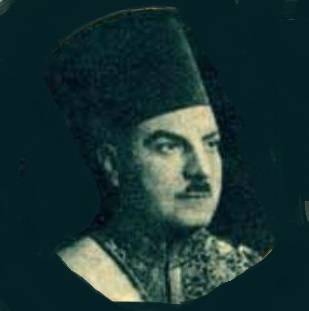 W
WHafez Afifi Pasha was an Egyptian politician. He held posts including serving as Ambassador of Egypt to the United Kingdom, on the United Nations Security Council and as head of Farouk of Egypt's royal cabinet.
 W
WTalaat Harb Pacha was a leading Egyptian entrepreneur and founder of Banque Misr, and its group of companies, in May 1920.
 W
WAhmed Hassanein Pasha, KCVO, MBE or Aḥmad Moḥammad Makhlūf Ḥasanēn al-Būlākī was an Egyptian courtier, diplomat, politician, and geographic explorer. Hassanein was the tutor, Chief of the Diwan and Chamberlain to Farouk, the king of Egypt from 1936 to 1952, and also represented Egypt in the 1924 Summer Olympics in fencing.
 W
WMohammed Hussein Heikal was an Egyptian writer, journalist, politician and Minister of Education in Egypt.
 W
WThe history of Egypt under the Muhammad Ali dynasty (1805–1953) spanned the later period of Ottoman Egypt, the Khedivate of Egypt under British occupation, and the nominally independent Sultanate of Egypt and Kingdom of Egypt, ending with the Revolution of 1952 and the formation of the Republic of Egypt.
 W
WHussein Fakhry Pasha (1843-1920) was the Prime Minister of Egypt for three days during the Khedivate of Egypt. He was Prime Minister from January 15, 1893 to January 18, 1893. He had previously served as a cabinet minister. He was Minister of Public Works during the building of the Aswan Low Dam and was appointed an honorary Knight Commander of the Order of St Michael and St George in 1902.
 W
WYahya Ibrahim (1936-1861) was an Egyptian politician. He served as the 16th Prime Minister of Egypt from March 15, 1923 to January 27, 1924.
 W
WMustafa Kamil Pasha was an Egyptian lawyer, journalist, and nationalist activist.
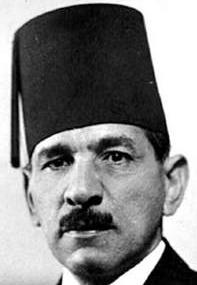 W
WAly Maher Pasha was an Egyptian political figure. He served as Prime Minister of Egypt from 30 January 1936 to 9 May 1936, a second term from 18 August 1939 to 28 June 1940, a third term from 27 January 1952 to 2 March 1952 and a final fourth term from 23 July 1952 to 7 September 1952. His final term ended when he was forced to resign for his opposition to Egyptian land reform.
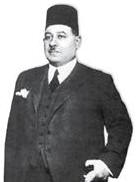 W
WAhmad Maher Pasha was the prime minister of Egypt from 10 October 1944 to 24 February 1945. He was a member of the Saadist Institutional Party and was appointed prime minister following the removal of Mustafa an-Nahhas Pasha by King Farouk.
 W
WNaguib Pasha Mahfouz is known as the father of obstetrics and gynaecology in Egypt and was a pioneer in obstetric fistula.
 W
WMohamed Mahmoud Pasha, also knowns as Mohamed Mahmoud Khalil Pasha, was Prime Minister of Egypt twice.
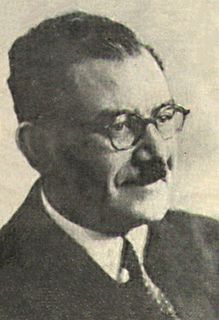 W
WDr. Ali Moustafa Mosharafa was an Egyptian theoretical physicist. He was professor of applied mathematics in the Faculty of Science at Cairo University, and also served as its first dean. He contributed to the development of the quantum theory as well as the theory of relativity.
 W
WAli Pasha Mubarak was an Egyptian public works and education minister during the second half of the nineteenth century. He is often considered one of the most influential and talented of Egypt's 19th century reformers. Ali Mubarak is known for his contribution in the reconstruction of Cairo's landscape and for founding Egypt's modern educational system.
 W
WMostafa el-Nahhas Pasha or Mostafa Nahas was an Egyptian political figure.
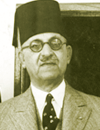 W
WNakhla Jurji al-Motyei Pasha was an Egyptian politician. He was Egypt's Minister of Foreign Affairs during the first half of 1933, in the government of Isma'il Sidqi.
 W
WMohamed Tawfik Naseem Pasha was an Egyptian political figure of Turkish origin. He served as the prime minister of Egypt between May 1920 and 1921, again from 1922 until 1923, and finally between 1934 and 1936. He was also Minister of the Interior under Yusuf Wahba Pasha from November 1919 to May 1920.
 W
WMuhammad Ahmad Abbud Pasha (1899–1963) was an Egyptian entrepreneur and business magnate.
 W
WAhmed Ziwar Pasha (1864–1945) was the prime minister of Egypt from 24 November 1924 to 7 June 1926.
 W
WAli Shamsi Pasha was an Egyptian statesman.
 W
WHassan Sabry Pasha was an Egyptian politician who briefly served as prime minister of Egypt in 1940.
 W
WHussein, Pasha Roshdy (1863–1928) was an Egyptian political figure of Turkish origin who served as Prime Minister of Egypt between 1914 and 1919.
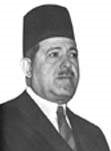 W
WMahmoud Fahmy El Nokrashy Pasha was an Egyptian political figure. He was the second prime minister of the Kingdom of Egypt.
 W
WMohamed Said Pasha, was Prime Minister of Egypt from 1910 to 1914, and again in 1919. He was born in Alexandria to a family of Turkish origin. He was the father of the artist Mahmoud Sa'id and grandfather of Queen Farida of Egypt.
 W
WRiyad Pasha was an Egyptian statesman. His name can also be spelled Riaz Pasha and Riyāḍ Bāshā. He served as Prime Minister of Egypt three times during his career. His first term was between September 21, 1879 and September 10, 1881. His second term was from June 9, 1888 to May 12, 1891. His final term lasted from January 17, 1893 to April 16, 1894.
 W
WIsma'il ibn Ahmad ibn Hassan bani Yani, known simply as Isma'il Ragheb Pasha (1819–1884), was a Greek Ottoman politician who served as Prime Minister of Egypt and held several other high-ranking government positions.
 W
WHussein Refki Pasha Ahmed Hafez Mohammed Hafez was an Egyptian military general and politician who served as Egypt's 25th Minister of War and Marine.
Sherif Sabri Pasha was the brother of Nazli Sabri, Queen consort of Egypt. He was thus the maternal uncle of Nazli's son King Farouk I, and served on the three-member Regency Council that was formed in 1936-37 during the latter's minority. Sherif Pasha Sabri was 41 years old at the time, and had previously held the post of Undersecretary for Foreign Affairs.
 W
WAbdel Khalek Sarwat Pasha (1873–1928) was an Egyptian political figure. Khalek served as the Prime Minister of Egypt from 1 March 1922 until 30 November 1922, and again between 26 April 1927 and 16 March 1928. He was of Turkish origin.
 W
WAhmed Lutfi el-Sayed or Aḥmad Luṭfī Sayyid Pasha was a prominent Egyptian nationalist, intellectual, anti-colonial activist and the first director of Cairo University. He was an influential person in the Egyptian nationalist movement and used his position in the media to strive and gain an independent Egypt from British rule. He was also one of the architects of modern Egyptian nationalism as well as the architect of Egyptian secularism and liberalism. He was fondly known as the "Professor of the Generation". Lutfi was one of the fiercest opponents of pan-Arabism, insisting that Egyptians are Egyptians and not Arabs. He is considered one of the most influential scholars and intellectuals in the history of Egypt.
 W
WIsmail Selim Pasha, also known as Ismail Ferik Pasha, was an Ottoman-Egyptian general of Greek origin. He also served as Minister of Military Affairs of Eyalet of Egypt, which is Ottoman Empire's administrative state. Selim Pasha was the brother of the Greek merchant and benefactor Antonios Papadakis.
 W
WFouad Pasha Serageddin, was a leader of Egypt's Wafd Party.
 W
WHussein Serry Pasha (1894–1960) was an Egyptian politician. He served as 25th Prime Minister of Egypt for three short periods, during which he also served as foreign minister.
 W
WAhmed Shawqi, nicknamed the Prince of Poets, was an Arabic poet laureate, to the Arabic literary tradition.
Mohamed Sherif Pasha GCSI (1826–1887) was an Egyptian statesman of Turkish origin. He served as Prime Minister of Egypt three times during his career. His first term was between April 7, 1879 and August 18, 1879. His second term was served from September 14, 1881 to February 4, 1882. His final term was served between August 21, 1882 and January 7, 1884.
 W
WAli Pasha Mohamed Sherif was an Egyptian government official and a renowned breeder of Arabian horses during the late 19th century.
 W
WMarcus Simaika (1864–1944) was an Egyptian Coptic leader, politician, and founder of the Coptic Museum in Cairo.
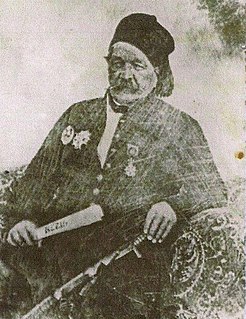 W
WSoliman Pasha al-Faransawi, born Joseph Anthelme Sève, was a French-born Egyptian commander.
 W
WHadım (Eunuch) Suleiman Pasha was an Ottoman statesman and military commander. He served as the viceroy of Ottoman Egypt in 1525–1535 and 1537–1538, and as Grand Vizier of the Ottoman Empire between 1541 and 1544. He was a Hungarian eunuch, his epithet hadım meaning "eunuch" in Turkish.
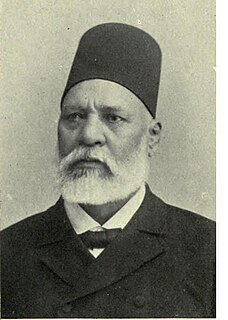 W
WAhmed ʻUrabi, also known as Ahmed Ourabi or Orabi Pasha, also spelled Arabi or Araby Pasha, was an an officer of the Egyptian army. The first political and military leader in Egypt to rise from the fellahin, ʻUrabi participated in an 1879 mutiny that developed into the ʻUrabi revolt against the administration of Khedive Tewfik, which was under the influence of an Anglo-French consortium. He was promoted to Tewfik's cabinet and began reforms of Egypt's military and civil administrations, but the demonstrations in Alexandria of 1882 prompted a British bombardment and invasion which led to the capture of ʻUrabi and his allies and the imposition of British control in Egypt. ʻUrabi and his allies were sentenced by Tewfik into exile in Ceylon.
 W
WYoussef Wahba Pasha (1852-1934) was an Egyptian Prime Minister and jurist.
 W
WYahya, Pasha Ibrahim (1876–1951) was an Egyptian political figure. He served as Prime Minister of Egypt from 1933 to 1934.
 W
WAdly Yakan Pasha, sometimes referred to as Adly Pasha, was an Egyptian political figure. He served as the 14th Prime Minister of Egypt between 1921 and 1922, again between 1926 and 1927, and finally in 1929. He held several prominent political posts including Foreign Minister, Interior Minister and Speaker of the Egyptian Senate.
 W
WSaad Zaghloul was an Egyptian revolutionary and statesman. He was the leader of Egypt's nationalist Wafd Party. He served as Prime Minister of Egypt from 26 January 1924 to 24 November 1924.
 W
WAhmad Zaki Pasha was an Egyptian philologist, sometimes called the "Dean of Arabism" or "Shaikh al-Orouba ", and longtime secretary of the Egyptian Cabinet.
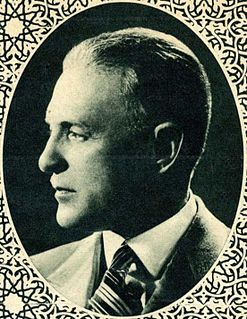 W
WYoussef Zulficar Pasha was an Egyptian judge. He was the father of Queen Farida of Egypt and thus father-in-law of King Farouk I.